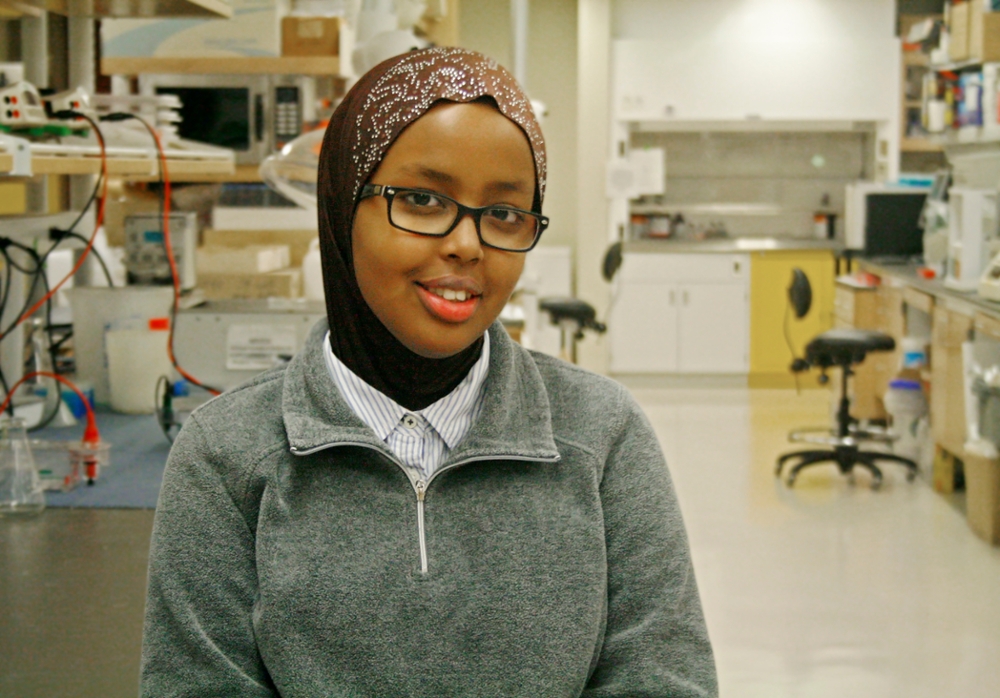
A Prescription for Research
Kawthar Mohamed shares her story of working as a summer research assistant in the exciting field of cannabinoids.
Questioning: a research foundation
The field of research may be intimidating to some; as a first-time researcher, I felt a bit overwhelmed initially. There were things that I did not know and concepts that I did not understand. However, the research environment encourages you to ask questions. Asking questions is fundamental to the learning process.
I have always had an interest in the function of drugs: what they do to our bodies, how they work, and what benefits and adversities exists for certain substances. This was the motivation behind me seeking a supervisor conducting extraordinary research in the field of pharmacology. Fortunately, this past summer, I was able to find exactly what I was looking for. Specifically, I found a research supervisor, Dr. Robert Laprairie, who is conducting research in the exciting field of cannabinoids.
In the project I worked on, I was assessing the pharmacology of four different phytocannabinoids on the type two cannabinoid receptor. I primarily assessed two aspects associated with receptor activation: ERK phosphorylation and β-arrestin2 recruitment. Assessing these aspects allows us to have a better understanding of how the different phytocannabinoids affect the receptor. Next, I would like to assess the binding affinity of these phytocannabinoids on the receptor to better understand the results I previously obtained.
Since this was my first summer partaking in a research project, I was anxious and unsure of what to expect. I anticipated that I would learn many new things as I had no previous lab experience and my knowledge in the field of pharmacology was basic. I was also interested in getting a better understanding of how research works. I have always considered pursuing research as part of my future career path and thus it was a great opportunity to see first-hand how research is carried out.
Planning: a research trajectory
It started with my planning ahead to conduct in vitro cell assays. The ability to conduct these assays is dependent on cell growth. Thus if I neglected to plan ahead, I would waste a few days waiting for the cells to grow; these are days that would have been used to conduct more assays. By planning ahead, I became better prepared for the weeks ahead of me and was able to ensure that I maximized my time in the lab. I got into the habit of planning two to three weeks ahead
The field of cannabinoid research is very current and will continue to be for the foreseeable future. This is because in addition to being nationally legalized, there is still so much that we do not know about cannabis and cannabinoids. For example, there are at least 120 cannabinoids which have been isolated from Cannabis thus far. However, the pharmacology of most of these compounds remains unknown. Of the two cannabinoid receptors which have been so far identified, the CB2 receptor is not understood as well as its CB1 counterpart. My project this summer was assessing the pharmacology of four different phytocannabinoids (i.e. plant derived cannabinoids) and their effects on the CB2 receptor. This research is valuable as it can lead to a better understanding of the general effects of these compounds on the human body and potentially to the development of novel therapeutics.
Building: a record of research
Through this summer research project, I learned that in science, and in research in general, things can, and do, go wrong. An experiment may yield an unexpected or undesirable result. However, that is still okay. Part of research is accepting and learning from the unexpected; this, in fact, encourages problem solving and teamwork. There are many people who aided me in the research process and who created a comfortable, inclusive and affirming research environment.
- The lab technician, who showed me the ropes and was understanding when I was slow or made mistakes
- The wonderful, reliable lab mates, the experienced ones who gave helpful tips, answered questions, and provided advice
- My supervising professor, for granting this opportunity and for being so supportive
I was fortunate to have the opportunity to present my research twice on campus thus far. At first, I was worried about presenting my research because it was a new experience for me. However, with time and practice, I noticed that my presentation skills were improving and I felt more confident. Initially, I presented at the Saskatchewan Cannabinoid Research Symposium and then at the Undergraduate Student Research Assistantship (USRA) Summer Social and Poster Day, alongside other recipients of the Natural Sciences and Engineering Research Council (NSERC) USRAs. I found that I really enjoy having the opportunity to share my research with fellow peers and the general public. It feels great to talk with others about the research I am conducting and its importance.
The best way for students to get involved in research is to actively look for opportunities. Sometimes positions may be posted online or a professor may mention them in class. But, many research opportunities are not openly advertised. So, I recommend that any interested student should make an effort to find a professor who is conducting research in a field that interests them and contact them formally by email, during office hours, or after class. In my case, I came across a professor on the faculty list for one of the professional health colleges at the university. Although he was not one of my professors, nor did he explicitly advertise that he was looking for summer students, I decided to give it a shot. I sent an email inquiring if any positions were available and was offered a position, later securing funding through an NSERC USRA award. I really encourage undergraduate students to partake in research at some point in their academic career. It truly is a wonderful and unforgettable learning experience.

